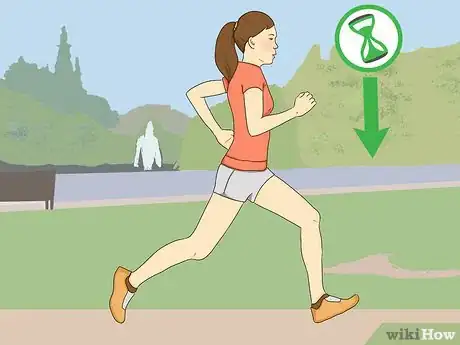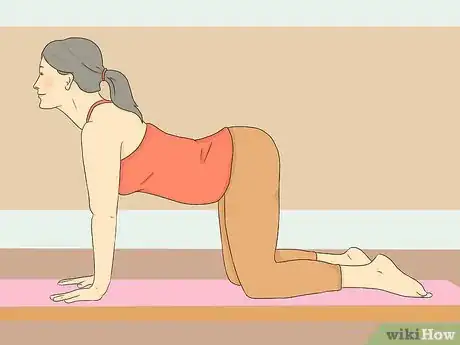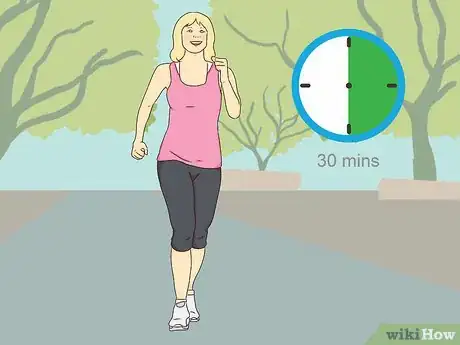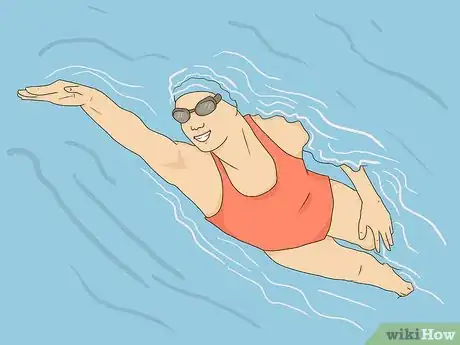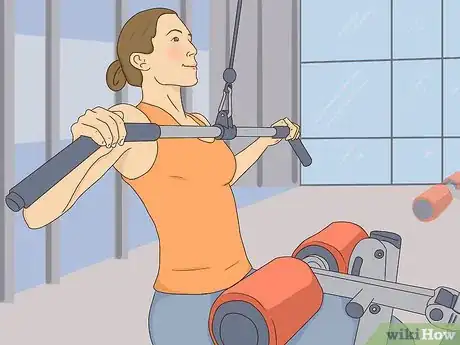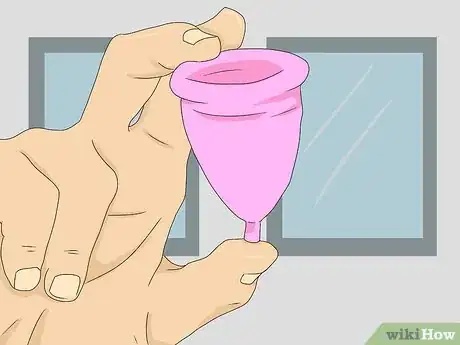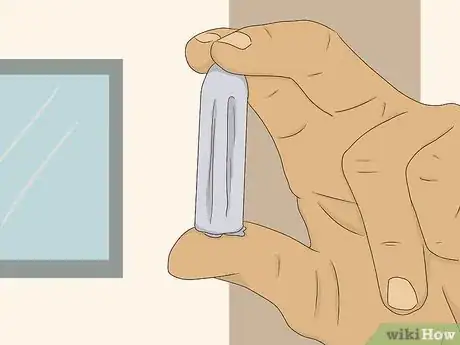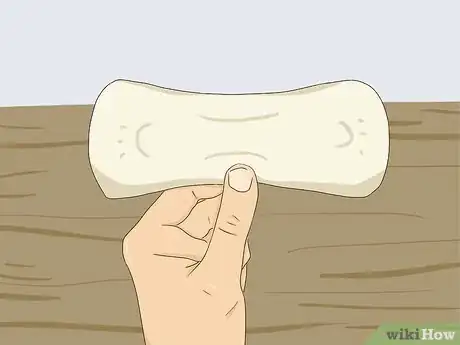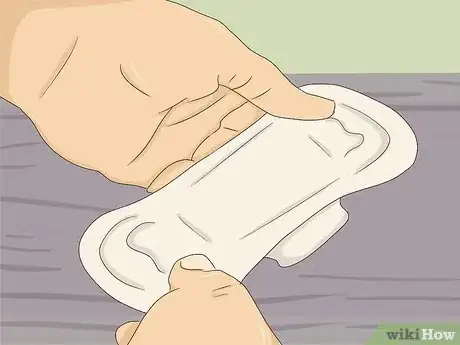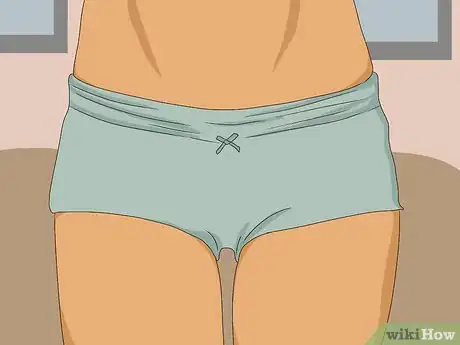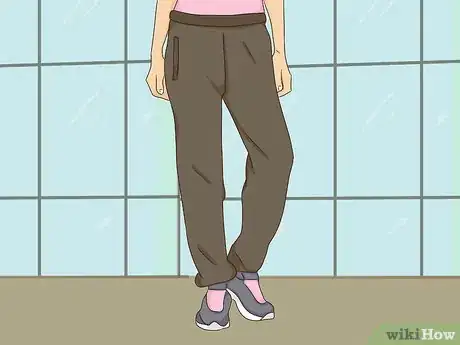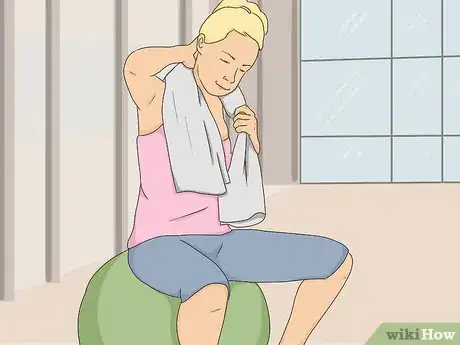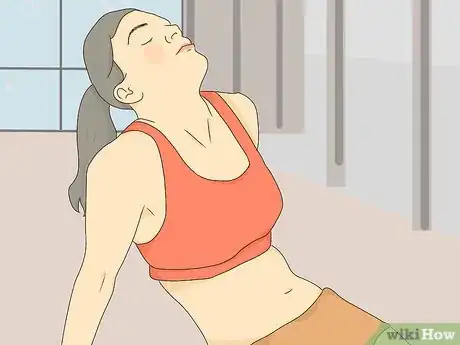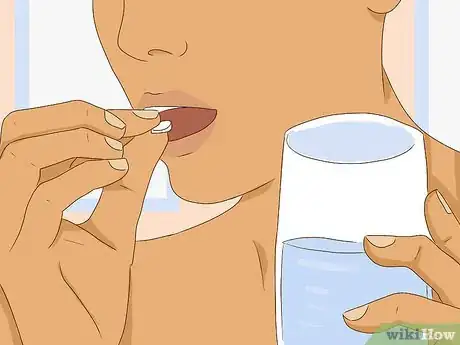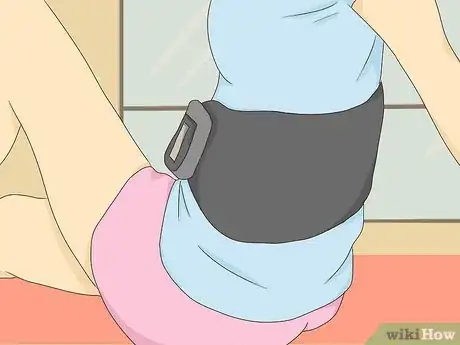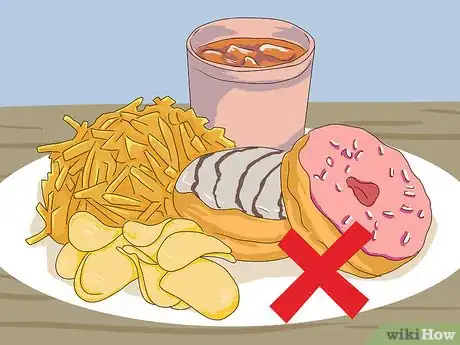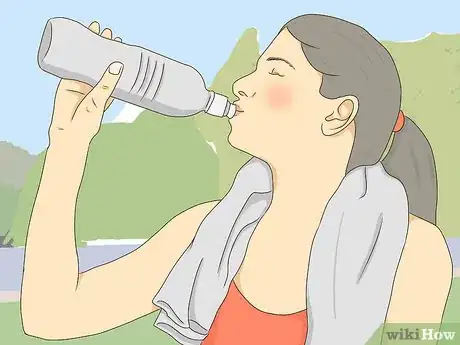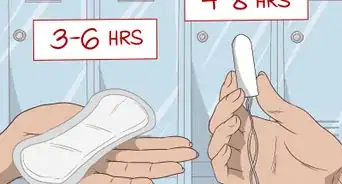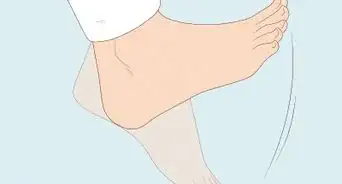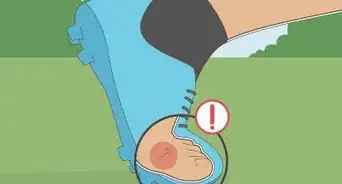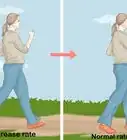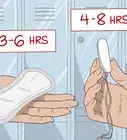This article was medically reviewed by Luba Lee, FNP-BC, MS. Luba Lee, FNP-BC is a Board-Certified Family Nurse Practitioner (FNP) and educator in Tennessee with over a decade of clinical experience. Luba has certifications in Pediatric Advanced Life Support (PALS), Emergency Medicine, Advanced Cardiac Life Support (ACLS), Team Building, and Critical Care Nursing. She received her Master of Science in Nursing (MSN) from the University of Tennessee in 2006.
There are 10 references cited in this article, which can be found at the bottom of the page.
wikiHow marks an article as reader-approved once it receives enough positive feedback. This article received 11 testimonials and 85% of readers who voted found it helpful, earning it our reader-approved status.
This article has been viewed 1,018,771 times.
While your period may discourage you from working out, exercise can actually help reduce symptoms such as pain, cramping, and fatigue. Light exercise during the first few days can boost your mood while higher intensity exercise during the last few days may increase your strength. It’s a good idea to choose the right type of sanitary products before exercising to prevent leaks and discomfort. Remember, if you’re having cramps or other types of pain, it is always OK to take a day off.
Steps
Working Out Comfortably
-
1Lower the intensity of your exercise when your period first begins. The first few days of your period are typically the heaviest. This may also be when you feel the worst. Instead of doing endurance training or high-intensity workouts, try choosing a gentler version of your normal exercises.[1]
- For example, if you normally run three miles, try jogging slowly instead or cut the distance in half.
- If you're not feeling up to lifting weights, try doing body weight exercises instead.
-
2Perform yoga on days you feel sluggish. Gentle, stretching yoga exercises may provide relief while allowing you to build strength and flexibility. Avoid twists and inversions, as these may be uncomfortable on your period. You can try:[2]
- The child pose: sit on your knees and slowly bend forward until your forehead touches the floor. Extend your arms in front of you and rest for ten seconds.
- Cat pose: crouch on all fours, arch your back, and tuck your head. Hold for a few seconds and breathe.
- Knee-to-chest pose: lie on your back and bring your knees to your chest, hugging your calves with your arms.[3]
Advertisement -
3Do some light cardio. Cardio can help improve your symptoms, but you shouldn’t overdo it. Instead of running or going on the elliptical, go for a gentle jog, ride a bike, or take a brisk walk for thirty minutes.[4]
-
4Swim for thirty minutes. Swimming is a gentle, low impact exercise that can soothe back pain and cramps. Make sure to use a tampon or menstrual cup instead of pads if you’re swimming.[5]
-
5Start lifting weights towards the end of your period. As your period ends, you may feel stronger or more tolerant of pain. This is a great time to do strength training. Go through your regular weightlifting routine, or do a bit of leg and arm work. You can continue to get the benefits up to a week after your period ends.[6]
- If you don't normally lift weights, try starting out on the weight machines at the gym. Try the leg press, the lateral pull down machine, or the shoulder press.
- A floor press is a good exercise for your period. Hold a dumbbell in each hand. Lie on your back with your knees bent and your feet together. Start with your elbows bent against the floor and slowly raise them until your arms are straight. Do two or three sets of eight to ten reps.
- Avoid any moves that put strain on your stomach or back, as these may be more uncomfortable during your period.
Choosing the Right Protection
-
1Try using a menstrual cup. When used properly, a menstrual cup may be the best option for exercising during your period. These cups are reusable, and they can stay in place for up to twelve hours.
- Menstrual cups are ideal if you are doing endurance training, running a marathon, or hiking. Menstrual cups may move around during yoga, however.
- Once a menstrual cup is in, you should feel no discomfort, but some people may struggle with placing the cup.
-
2Insert a new tampon just before exercising. If you don’t have a menstrual cup, buy a box of tampons instead. Tampons are not comfortable for everyone during exercise, however. If you find that you can’t exercise with a tampon in, try another method instead.
- "Sport" tampons are designed for workouts. You can try using these if normal tampons are uncomfortable while you exercise.
-
3Apply a pantyliner if you’re prone to leaks. If you have a heavy flow, you may need more protection. Use a pantyliner in addition to a menstrual cup or tampon. Put a new one in your undies just before exercising.
-
4Use pads if you can't use tampons or menstrual cups. Pads may cause uncomfortable chafing as you exercise. They can also scrunch up as you exercise, giving you less protection than you may need. If tampons and menstrual cups don't work for you, however, pads may be your only option.
-
5Choose boy shorts or hipster underwear. The underwear should be made out of a breathable fabric such as cotton. Underwear with more coverage will be more comfortable and prevent more leaks than a thinner type, such as a thong.[7]
- You can even invest in a pair of period-proof underwear, such as Thinx. These can be worn in addition to or instead of a tampon or menstrual cup.[8]
-
6Wear dark, loose-fitting clothing. Pants and shirts that are too tight might cause discomfort, especially if you’re experiencing cramps, constipation, or bloating. Instead, choose looser clothing. Make sure that your pants are dark, just in case there’s a leak!
- For example, instead of tight leggings, wear loose sweatpants to the gym.
- A cotton t-shirt or tank top is perfect, especially if you don’t tolerate heat well on your period.
Reducing Pain or Discomfort
-
1Exercise when you feel tired. Feeling tired during your period can make you dread going to the gym, but this is the best time to exercise. A good workout can actually boost your energy during your period.[9]
-
2Take a break if you feel pain. If you have cramps, bloating, or other uncomfortable symptoms, it’s OK to skip the gym. Get some rest, drink plenty of water, and try again the next day.[10]
-
3Take a pain reliever before you exercise. Even if you’re not feeling crampy yet, you can prevent any discomfort by taking a non-steroidal anti-inflammatory drug (NSAID), such as ibuprofen, up to an hour before you exercise. This will prevent pain before it happens.[11]
-
4Apply a heat therapy wrap to your stomach or back before you exercise. Heat can reduce any pain you might feel. Disposable heat wraps adhere to your skin, providing soothing warmth during your workout. You can purchase them at drug stores or grocery stores.[12]
-
5Avoid fatty, sugary, or salty foods. These foods can make you bloat, and they may worsen cramping or back pain. Avoiding these foods may also help you reach your workout goals faster. On your period, stay away from:[13]
- Baked goods like donuts and muffins.
- Processed snacks like chips and crackers.
- Fried foods like french fries.
- Soda.
-
6Drink water before, during, and after your workout. During your period, your body needs more water than usual. Staying hydrated may reduce headaches or bloating that might occur. Drink 8 ounces (230 g) fifteen minutes before you start exercising, and continue to drink water throughout your workout.[14]
Expert Q&A
-
QuestionCan I do abdominal exercises during my period?
 Luba Lee, FNP-BC, MSLuba Lee, FNP-BC is a Board-Certified Family Nurse Practitioner (FNP) and educator in Tennessee with over a decade of clinical experience. Luba has certifications in Pediatric Advanced Life Support (PALS), Emergency Medicine, Advanced Cardiac Life Support (ACLS), Team Building, and Critical Care Nursing. She received her Master of Science in Nursing (MSN) from the University of Tennessee in 2006.
Luba Lee, FNP-BC, MSLuba Lee, FNP-BC is a Board-Certified Family Nurse Practitioner (FNP) and educator in Tennessee with over a decade of clinical experience. Luba has certifications in Pediatric Advanced Life Support (PALS), Emergency Medicine, Advanced Cardiac Life Support (ACLS), Team Building, and Critical Care Nursing. She received her Master of Science in Nursing (MSN) from the University of Tennessee in 2006.
Board-Certified Family Nurse Practitioner Generally speaking, you should avoid strenuous exercises that involve your abdomen during your period as it can make your period heavier and increase cramps. I would advise against abdominal crunches. However, gentle exercises involving your stomach should be okay.
Generally speaking, you should avoid strenuous exercises that involve your abdomen during your period as it can make your period heavier and increase cramps. I would advise against abdominal crunches. However, gentle exercises involving your stomach should be okay. -
QuestionMy periods are not regular. I only get them for one day, and I am also gaining weight. What should I do?
 Luba Lee, FNP-BC, MSLuba Lee, FNP-BC is a Board-Certified Family Nurse Practitioner (FNP) and educator in Tennessee with over a decade of clinical experience. Luba has certifications in Pediatric Advanced Life Support (PALS), Emergency Medicine, Advanced Cardiac Life Support (ACLS), Team Building, and Critical Care Nursing. She received her Master of Science in Nursing (MSN) from the University of Tennessee in 2006.
Luba Lee, FNP-BC, MSLuba Lee, FNP-BC is a Board-Certified Family Nurse Practitioner (FNP) and educator in Tennessee with over a decade of clinical experience. Luba has certifications in Pediatric Advanced Life Support (PALS), Emergency Medicine, Advanced Cardiac Life Support (ACLS), Team Building, and Critical Care Nursing. She received her Master of Science in Nursing (MSN) from the University of Tennessee in 2006.
Board-Certified Family Nurse Practitioner If this is an ongoing issue, then it is important for you to see a doctor about it.
If this is an ongoing issue, then it is important for you to see a doctor about it. -
QuestionIs it safe to lift weights while I am on my period?
 Luba Lee, FNP-BC, MSLuba Lee, FNP-BC is a Board-Certified Family Nurse Practitioner (FNP) and educator in Tennessee with over a decade of clinical experience. Luba has certifications in Pediatric Advanced Life Support (PALS), Emergency Medicine, Advanced Cardiac Life Support (ACLS), Team Building, and Critical Care Nursing. She received her Master of Science in Nursing (MSN) from the University of Tennessee in 2006.
Luba Lee, FNP-BC, MSLuba Lee, FNP-BC is a Board-Certified Family Nurse Practitioner (FNP) and educator in Tennessee with over a decade of clinical experience. Luba has certifications in Pediatric Advanced Life Support (PALS), Emergency Medicine, Advanced Cardiac Life Support (ACLS), Team Building, and Critical Care Nursing. She received her Master of Science in Nursing (MSN) from the University of Tennessee in 2006.
Board-Certified Family Nurse Practitioner Everybody is different and you should listen to your body. Gentler weight lifting is preferred. I would recommend avoiding very strenuous, heavy weight lifting regimens while you are on your period.
Everybody is different and you should listen to your body. Gentler weight lifting is preferred. I would recommend avoiding very strenuous, heavy weight lifting regimens while you are on your period.
References
- ↑ http://www.cosmopolitan.com/health-fitness/advice/a36925/the-best-workout-to-do-when-you-have-your-period/
- ↑ https://www.yogajournal.com/poses/contraindications-modifications/menstruation-contraindications-modifications
- ↑ https://www.doyouyoga.com/6-yoga-poses-to-relieve-menstrual-cramps-37359/
- ↑ http://www.cosmopolitan.com/health-fitness/advice/a36925/the-best-workout-to-do-when-you-have-your-period/
- ↑ http://www.cosmopolitan.com/health-fitness/advice/a36925/the-best-workout-to-do-when-you-have-your-period/
- ↑ https://www.bodybuilding.com/fun/4-ways-your-mentrual-cycle-affects-your-workouts.html
- ↑ http://www.elle.com/beauty/health-fitness/news/g27163/underwear-to-work-out/
- ↑ http://www.health.com/menstruation/5-things-to-know-about-exercising-during-your-period
- ↑ http://www.womenshealthmag.com/fitness/period-workout
- ↑ http://www.health.com/menstruation/5-things-to-know-about-exercising-during-your-period
- ↑ http://www.health.com/menstruation/5-things-to-know-about-exercising-during-your-period
- ↑ http://www.cosmopolitan.com/health-fitness/advice/a36925/the-best-workout-to-do-when-you-have-your-period/
- ↑ http://www.byrdie.com/best-foods-to-eat-on-your-period/
- ↑ http://www.shape.com/lifestyle/mind-and-body/exercise-and-your-menstrual-cycle-what-your-period-means-your-workout
